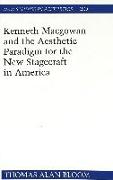- Start
- Kenneth Macgowan and the Aesthetic Paradigm for the New Stagecraft in America
Kenneth Macgowan and the Aesthetic Paradigm for the New Stagecraft in America
Angebote / Angebote:
The American theatrical critic Kenneth Macgowan fashioned an aesthetic defense for a new visual style of scenic design that began to appear on the American stage during the second decade of the twentieth century. Macgowan's defense for this new visual style, which he labeled the «new stagecraft», was modeled after the British art critic Clive Bell's aesthetic theory of «significant form» in art. Bell's formal theory of art, which favored formal abstraction over visual representation, provided Macgowan with an attractive premise upon which he could formulate his own theory of the simplified or abstracted new stagecraft style. Shaping his theory of the new stagecraft from an aesthetic theory devised for the static two-dimensioned space of the painting, Macgowan sought to apply the visual aesthetic of significant form to the four-dimensioned theatrical process. The contradictions caused by the application of Bell's theory to the dynamics of scenic design reanimated the dispute between the preeminence of form or content, picture or word in the theater.
Libri-Titel folgt in ca. 2 Arbeitstagen
